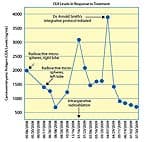Life Extension Magazine®
Cancer kills 1,500 Americans every day.1 What if you knew how to prevent or at least postpone these deaths? Could you keep this information to yourself? We at Life Extension® have wrestled with this dilemma for nearly 30 years. Our health advisors receive numerous calls from those stricken with cancer. In too many instances, these patients have already failed conventional therapies and seek alternative approaches. If only these patients had contacted us earlier, we could have provided guidance to improve their chances of first-time curative treatment. When malignancies reach an advanced stage, they are difficult to cure. That’s because during exposure to toxic conventional therapies, cancer cells not killed may undergo mutations that make them highly resistant to eradication. I am going to discuss some remarkable treatments that have reversed the course of end-stage disease. I must first, however, tell you what Life Extension® and Suzanne Somers are doing to enlighten newly diagnosed cancer patients about critical steps they should consider to reduce their risk of recurrence and metastasis. Deadly ApathyToday’s medical oncologists sign many death certificates, yet seem oblivious to the fact that their treatments are failing.
Sadly, few oncologists implement creative multi-modal treatments whose safety and efficacy is documented in the peer-reviewed medical literature. I have been privileged to work with oncologists and other professionals who do not accept status quo mortality statistics when treating their patients. These professionals delve into scientific journals to uncover novel treatments that apathetic oncologists do not take the time to even consider. While Life Extension® has long shared this life-saving data with our members, the number of human lives lost to cancer continues to spiral upwards. If current trends continue, cancer may be the leading cause of death in 2010. So what is the most efficient way to disseminate life-saving discoveries to the greatest number of cancer patients? Suzanne Somers Exposes the Cancer Establishment’s FailingsEarlier this year, actress Suzanne Somers called me about a new book she felt compelled to write. She had been hospitalized with an infection, but her doctors told her she suffered from metastatic breast cancer that required immediate chemotherapy. Had Suzanne believed her doctors, they would have dumped toxic chemo drugs into her body. She would then display classic signs/symptoms associated with cancer chemotherapy such as immune impairment, nausea, hair loss, emaciation, etc. If Suzanne died from chemotherapy-induced complications, which was possible since she suffered an infection that required her immune system to battle, her doctors would have proclaimed that she died of metastatic breast cancer. Suzanne wondered how many others perish this way at the hands of the cancer establishment.
To get to the bottom of this, Suzanne reached out to doctors who have been on the front lines battling the cancer establishment. Suzanne was so appalled by what she learned about conventional medicine’s gross incompetence that she vowed to expose these atrocities to the world. I am enthused because Suzanne has incorporated some of Life Extension®’s most recent avant-garde cancer discoveries into her new book titled Knockout (Crown, 2009). Instead of this life-sparing information being limited to readers of this magazine, Suzanne is getting this critical data into the hands of tens of millions of cancer patients around the world. An example of the quality of information contained in Suzanne’s new book can be found in the article in this month’s issue that discusses critical decisions that cancer patients need to make before surgery. As we meticulously detail, the right choices made prior to surgery can dramatically reduce the risk of local recurrence and distant metastases. Simple Methods Can Save Many LivesColon cancer kills 55,000 Americans every year.2 Most of these deaths are needless. When taken immediately after surgery, a drug available over-the-counter called cimetidine slashes the ability of colon cancer cells to metastasize.3-7 Just as the life-saving benefits of aspirin were overlooked by cardiologists for decades, so have the anti-cancer effects of cimetidine been ignored by the cancer establishment. Cimetidine has proven immune-boosting properties8-10—it inhibits angiogenesis11—and it can block the adhesion of tumor cells to blood vessel walls where they establish metastatic colonies.3,12,13 When administered to patients with certain types of colon cancer before and/or immediately after surgery, 10-year survival improves by almost three-fold!14
Life Extension® first recommended cimetidine in 1985 as an adjuvant cancer therapy. Since then, a plethora of published scientific studies document remarkable survival improvements when patients with many kinds of cancer take this non-toxic drug.14,15 Despite these impressive findings, virtually no colon cancer patients are placed on 800 mg each day of cimetidine by their oncologists. Death rates from melanoma continue to spiral upwards.1 Most of these deaths are also needless. For example, a recent study compared the effects of administering alpha-interferon with or without CoQ10 (200 mg two times daily) to patients with Stage 1 or Stage 2 disease after excision of the melanoma lesion. There was an astounding 10 times lower risk of metastasis in the CoQ10 supplemented group!16 This effect was even more pronounced for those with more advanced melanoma, where CoQ10 supplemented patients were 13 times less likely to develop metastasis. Alpha-interferon is an immune boosting drug that can induce side effects so severe that patients have to discontinue it. In this study,16 only 22% of CoQ10 supplemented patients developed side effects, compared to 82% not taking supplemental CoQ10. Coenzyme Q10 has been shown to slow tumor growth via several mechanisms that include immune augmentation,17-21 suppression of vascular endothelial growth factor22 (that facilitates tumor angiogenesis), and reduction of inflammatory markers23-25 (that facilitate cancer cell propagation). Regrettably, the cancer establishment has ignored these promising discoveries that could save so many lives if initiated at an early stage when the disease is first diagnosed. That’s why it is so critical that Suzanne’s new book Knockout reaches the masses—to educate cancer patients about what their doctors are not doing. The Straw That Breaks the Back of the Cancer EstablishmentWhy is cancer such a feared disease? Why did a judge earlier this year order a mother to give her dying son chemotherapy and the mother instead fled with her son to try to live as a fugitive? Why do so many cancer patients choose suicide rather than face the agonies of conventional therapy? Why does the cancer establishment require the government to initiate police state actions against those who offer different kinds of therapies? The apathy, incompetence, and inadequacies of the cancer establishment are no secret. Yet for millions of cancer patients each year, they have little choice. They are told by their local oncologist that if they refuse conventional therapy, they will die. Some are cured, many are not. The “cured” often suffer lifelong mutilation and side effects that increase their risk of future diseases. Hundreds of books have been written about better ways to treat cancer. None of these books have been authored by a celebrity who can get this vital information into enough people’s hands to initiate a revolt against the entrenched cancer establishment. The scientific data presented in Suzanne’s new book Knockout, accompanied by her high profile status and unique ability to relate to the public—just might be enough to enable meaningful reform to occur in the way that all cancer patients are treated. What About Those Who Have Already Had Failed Surgery, Chemo, Etc.?As I stated in the beginning of this article, all is not lost even if improper conventional therapy is administered. Life Extension is honored to associate with oncologists who “think outside the box” when treating those who mainstream doctors claim are “terminal.” Earlier this year, one of the progressive oncologists we work with (Arnold Smith, MD) called me frantically excited. We had featured an article in Life Extension Magazine® about Dr. Smith’s success in reversing the course of advanced-stage lung cancer. A Life Extension® member suffering from advanced metastatic liver cancer contacted Dr. Smith. Even though this patient had already failed all conventional therapies, Dr. Smith was willing to design a comprehensive program utilizing our cancer treatment protocols, along with an individualized dose of an immune-boosting drug, interleukin-2. This patient presented with CEA blood reading of 3,800 ng/mL. CEA stands for carcinoembryonic antigen, and is a highly accurate way of tracking visceral malignancies such as metastatic liver cancer. The CEA reading in healthy people is normally under 4.0 ng/mL, so the 3,800 reading in this patient was exceptionally high. Virtually everyone dies before their CEA reaches 7,000, which is where this patient was headed.
In response to this multi-modal treatment approach designed by Dr. Smith using relatively non-toxic medications and nutrients, this patient’s CEA plummeted to 978 in two weeks. A month later, it had fallen further to 670. This patient reported feeling in excellent health. He was able to play golf and exercise and be normally active. The horrendous side effects associated with conventional systemic chemotherapy were not present. This patient returned to his home in southern California and is back to full time work. This patient was pronounced “terminal” by his mainstream doctors. They had put him through every grueling toxic therapy approved by the FDA. All these conventional therapies failed. This patient’s willingness to travel out of state to Dr. Smith in Mississippi gave him a reprieve from what would be certain death. If it were not for the free publicity we gave to Dr. Arnold Smith, this person would not be alive! (Figure 1 to the right) on this page shows how conventional treatment was initially successful, but the patient’s CEA quickly elevated. You then see the plummeting CEA levels that occurred in response to treatment at Dr. Smith’s North Central Mississippi Regional Cancer Center. | |||||||||
This is Why We ExistI cannot tell you how gratifying it is every time I hear that a human life has been spared because of something we publish in this magazine. When I get these calls from doctors, the discussions inevitably turn to trying to figure out why these proven therapies continue to be overlooked by the mainstream. An abundance of published data shows that the FDA-approved immune boosting drug interleukin-2 is effective against common tumors, yet it is virtually never used.28-30 It’s as if the medical mainstream doesn’t care whether their patients live or die.
The Dirty Secret I Was Told DirectlyFor years, I read that large pharmaceutical companies buy up effective cancer drugs and intentionally suppress them in order to protect their highly profitable patented drugs. I never quite believed it until I heard it directly from a mainstream researcher. For the first time, I had dinner with a hardcore mainstream medical oncologist/researcher. The purpose of this meeting was to seek Life Extension® funding for a promising cancer drug. This was my first interaction with a mainstream oncologist—other than to have them arrogantly tell me what they won’t do for their patients. I was impressed enough with the data supporting this drug that I suggested it be offered at an offshore clinic, since FDA approval was years away. The mainstream oncologist was adamant that if he did this, the FDA would never approve it. Having battled the FDA for more than a decade to force them to approve the anti-viral drug ribavirin, I understood the problem. Ribavirin dramatically improves the effectiveness of alpha-interferon therapy in hepatitis C patients,31-33 but the FDA suppressed this drug for more than 15 years because the company promoted it before the FDA allowed it. The mainstream oncologist knew that by telling me that this drug might never make it to cancer patients, he would reduce his chances of securing Life Extension® funding. He was honest enough to warn me that there is a risk that a pharmaceutical company would buy the drug patent and sit on it. When I questioned the rationale behind this, the mainstream oncologist rattled off the outrageous profits pharmaceutical companies are making now, and how much they dislike upsetting their revenue streams with newer drugs. This was told to me from a credible source, who brought up the risk of pharmaceutical company suppression against his own financial interests, since it reduced my motivation in helping to fund his research. Having learned this, I cannot fathom how pharmaceutical people live with themselves when intentionally inflicting so much suffering and death on their fellow human beings. Prevention is Still the KeyWhile Life Extension® has made tremendous strides in identifying effective treatments overlooked by the establishment, the fact remains that most human cancers are preventable. An in-depth article in this month’s issue discusses how cancer develops and reveals proven methods to sharply reduce one’s risk of contracting this insidious disease. Why I Want Every American to Read Suzanne’s New BookThose who know the truth behind the heinous acts committed by the cancer establishment have always been the underdogs. The media often favors Big Pharma and the FDA, while viciously attacking those who advocate innovative cancer treatments. The death of Coretta Scott King is a perfect example. Conventional medicine failed her. In a last ditch desperate attempt, her family brought her partially paralyzed body to an alternative cancer clinic in Mexico. She died before treatment could begin. The media nonetheless immediately attacked the credibility of the alternative clinic. Coretta Scott King was so near death that the clinic could not even begin to treat her. The mere fact that she was intended to be treated with unapproved therapies was all the media needed to bash alternative medicine. The Mexican government quickly shut the alternative clinic down even though it never treated Coretta Scott King. I want to express my gratitude to Suzanne Somers for bringing out the lifesaving information contained in her new book Knockout. We hope you understand how today’s cancer industry, which financially thrives on the sale of toxic/minimally effective drugs, wants the knowledge Suzanne uncovers to remain repressed. For longer life,
William Faloon | |||
| References | |||
| 1. www.cancer.org/downloads/STT/500809web.pdf. 2. www.cdc.gov/cancer/colorectal/statistics/idex.htm. 3. Cancer Res. 2000 Jul 15;60(14):3978-84. 4. BMC Cancer. 2008;8376. 5. J Tongji Med Univ. 1999;19(4):300-3. 6. Gut. 1994 Nov;35(11):1632-6. 7. Eur J Surg Oncol. 1993 Aug;19(4):332-5. 8. Aust NZ J Surg. 1994 Dec;64(12):847-52. 9. Hepatogastroenterology. 2005 Mar;52(62):504-8. 10. Gan To Kagaku Ryoho. 2005 Oct;32(11):1576-7. 11. Biomed Pharmacother. 2005 Jan;59(1-2):56-60. 12. Zhonghua Yi Xue Za Zhi. 2006 Jul 11;86(26):1813-6. 13. Gan To Kagaku Ryoho. 2003 Oct;30(11):1788-90. 14. Br J Cancer. 2002 Jan 21;86(2):161-7. 15. Lancet. 1988 Oct 29;2(8618):990-2. 16. Melanoma Res. 2007 Jun;17(3):177-83. 17. Cas Lek Cesk. 2003;142(7):390-3. 18. Vaccine. 1998 Oct;16(16):1504-10. 19. Biochem Biophys Res Commun. 1993 May 28;193(1):88-92. 20. Drugs Exp Clin Res. 1985;11(8):539-45. 21. Mech Ageing Dev. 1978 Mar;7(3):189-97. 22. Basic Clin Pharmacol Toxicol. 2007 Jun;100(6):387-91. 23. Biofactors. 2008;32(1-4):179-83. 24. Biochim Biophys Acta. 2008 Feb;1780(2):203-13. 25. Biofactors. 2007;31(3-4):211-7. 26. www.lifeextension.com/magazine/mag97/june-report97.html. 27. www.reuters.com/article/pressRelease/idUS123977=27-May-2009=BW20090527. 28. Int J Cancer. 1999 Jan 29;80(3):425-30. 29. Cancer Immunol Immunother. 1991;33(1):9-14. 30. Biochem Biophys Res Commun. 2002 Dec 20;299(5):818-24. 31. Hepatol Res. 2009 Sep 25. 32. Clin Infect Dis. 2009 Oct 15;49(8):e84-e91. 33. Gastroenterology. 1999 Aug;117(2):408-13. |







